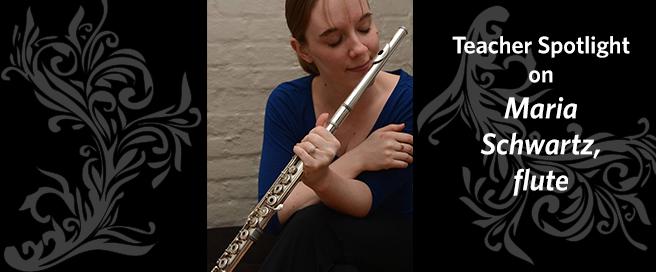Teacher Spotlight: Maria Schwartz, Suzuki flute

March 4th, 2018
Interview by Erin Cano, violin
Maria joined MIC in 2016
What led you to become a Suzuki teacher?
Part of why I became a Suzuki teacher was due to my own Suzuki experience. I joined Berta Frank’s flute studio during my third year of playing flute which helped strengthen my dedication to practicing and expand my listening skills. Later in college, I realized that dictation, sight singing, and quickly picking up melodies were awesome skills that were emphasized during my musical upbringing, specifically my Suzuki lessons.
I actually signed up for Suzuki training after I began teaching beginners. I realized that I felt unprepared even after hundreds of lessons myself and pedagogy classes in college. It bothered me that I didn't remember much about the pedagogy and practice methods from the instruction I received at a young age. A few colleagues suggested training and through this I also remembered more about my lessons with Berta. It was amazing to learn many new techniques for specifically teaching beginners which have continued to inspire me.
Which of your teachers inspired you the most? What aspects of their teaching have you integrated into your own style?
I feel especially lucky to have studied with Joshua Smith at the Cleveland Institute of Music. Hearing him play in the Cleveland Orchestra each week strongly motivated and influenced my practice in between lessons. He frequently suggests to “play with love” before performances or recitals, which is such a lasting remark. His teaching is driven by how to most accurately represent the music. This focus guided me to better determine how to bring my voice across through the flute. I also admire his wide range of tone colors and ability to blend which I try to emulate in my own practice. My inspiration from Mr. Smith helped me realize that I want my students to have fun and enjoy the music they create. I encourage them in any way I can think of to experiment with their sound and connect with their flute and practice time.
What is your favorite Suzuki piece to teach?
So far I’d have to say the Handel Allegro from Book 4. It seems limitless how many ways one can practice it! Allegro is a workout for the tongue, the fingers, and the air- all at the same time. It is harmonically and conversationally very detailed so it is wonderful to help a student discover more nuance about this piece. I also have really happy memories of (obsessively) listening to the Handel, so each time a student begins learning it I am easily excited.
You’ve performed extensively in both orchestras and chamber ensembles. What are some of your favorite performance experiences?
The experiences I enjoy the most usually start with a rehearsal process that is detailed and collaborative instead of long or tedious. There can be so much focus on the end product (the performance) that the work before that point may get discounted and overlooked. I really delight in finding small details to rehearse that add to how satisfying the whole experience feels. If the process before a performance shares energy and goals (most often listening and responding), then the performance becomes more memorable to me. Top examples of this process have included orchestral performances of works by Brahms, Strauss, and Bach.
Do you play any other instruments besides the flute? If not, what other instrument would you like to be able to play?
I regularly play the piccolo. It’s very similar to the flute for fingerings but because of the size difference (the piccolo is much smaller), my lips and air have to work differently. Part of my job in orchestra is to ‘double’, which means I switch back and forth between the piccolo and the flute. Depending on how quickly the composer writes for this switch to happen, it can be confusing for my embouchure. I’ve also always had a bit of cello-envy, which now that I think about it, isn’t really similar to the piccolo...
